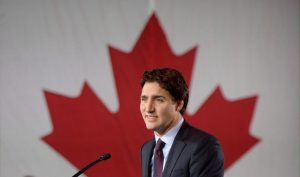Is Canada really immune from the populist wave or is it just pretending?

Is Canada’s prime minister Justin Trudeau sitting on a powder keg of sorts?
Ever wondered why Canada doesn’t seem caught up in the populist wave that’s affecting other western countries?
Don’t know about you but it’s been on my mind and here’s J.J. McCullough with an answer.
There is room for populist politics, which exists, albeit only unofficially. It will stay invisible until it doesn’t, possibly in 2019 when some one called Kellie Leitch may be able to bring her Trump-like ideas to the centre of public discourse.
Mr McCullough, a political commentator and cartoonist from Vancouver, recently described the irony and the apparent ecstasy of Canada’s situation. Writing in The Washington Post, he spoke of a nation so multicultural and immigrant-heavy that it ties with Germany for the G8’s highest per-capita immigration rate. And it has told itself it is too “good” to behave badly about immigration and other difficult issues. As he points out, many Canadians actually seem to believe in their inherent virtuousness.
Mr McCullough writes: “A recent article by Jonathan Kay, editor of Canada’s strenuously patriotic magazine The Walrus, proclaimed simply ‘Canadians are better than other people’.”
He goes on to describe essayist Stephen Marche’s theory of “Canadian Exceptionalism”. This, according to Mr McCullough, holds that “Canada has never lived by national pride, or by a numinous sense of blood and soil.”
And yet, Canadians are wary, some might almost say worried about the changes wrought by immigration.
Mr McCullough mentions a poll that has 68 per cent of Canadians agreeing that “minorities should do more to fit in with mainstream Canadian society”. And a majority of Canadians have constantly said they want to cap immigration levels. In 2015, a poll found 41 per cent believing their country lets in too many visually distinct minorities. (My sort of colour.)
What this probably means is that anti-immigration populism can become a political force – as and when times get especially hard, and/or there is a pronounced sense of insecurity at home either directly or indirectly related to immigrants.
Mr McCullough says Canada’s democracy is not very democratic – there is a pronounced lassitude about political party membership, for instance – and political debate is ring-fenced by clearly set parameters.
Apparently, Canada’s Le Pen like figure, a former cabinet minister Ms Leitch, wants to be the Conservative party’s prime ministerial candidate in 2019. She has called for “values tests” for immigrants, railed against “elites” and been endorsed a body that calls itself the “Council of European Canadians.”
My sense when reading Mr McCullough’s piece was that he feels the change underway in Canada – deep below the headlines and unity-in-diversity tableaux.

